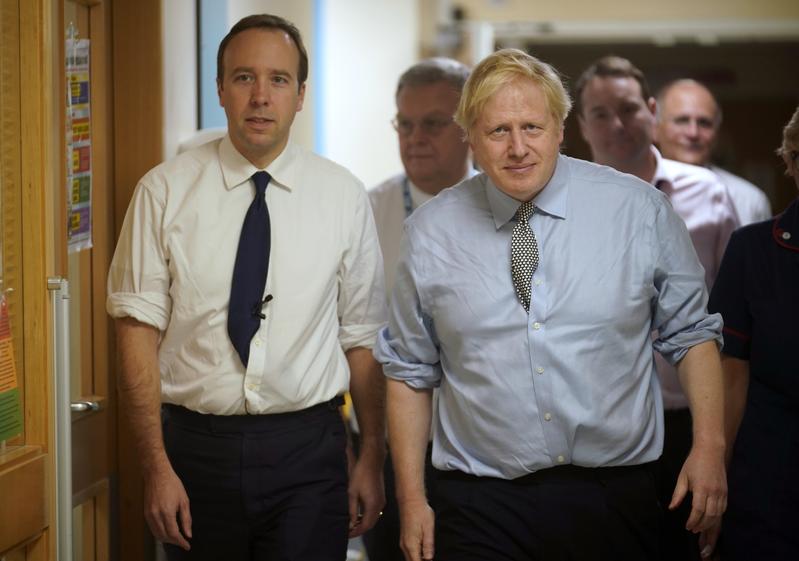 In this Nov 22, 2019 file photo, Britain's Prime Minister Boris Johnson, right, and Health Minister Matt Hancock visit Bassetlaw District General Hospital on their General Election campaign in Worksop, England. Matt Hancock has tested positive for the new coronavirus, March 27, 2020, the same day as Prime Minister Boris Johnson was confirmed to have COVID-19. (CHRISTOPHER FURLONG / POOL VIA AP)
In this Nov 22, 2019 file photo, Britain's Prime Minister Boris Johnson, right, and Health Minister Matt Hancock visit Bassetlaw District General Hospital on their General Election campaign in Worksop, England. Matt Hancock has tested positive for the new coronavirus, March 27, 2020, the same day as Prime Minister Boris Johnson was confirmed to have COVID-19. (CHRISTOPHER FURLONG / POOL VIA AP)
Members of the European Union's Parliament are calling on the United Kingdom to delay its full and final exit from the bloc until the time is right to negotiate a future trade deal.
I can only hope that common sense and substance will prevail over ideology. An extension of the transition period is the only responsible thing to do.
Christophe Hansen, member of the European People’s Party
The center-right European People's Party, the largest group in the EU Parliament, says the novel coronavirus outbreak, which has sickened the UK's prime minister and the EU's chief Brexit negotiator, has made it impossible to properly negotiate a deal.
The UK responded to the call by saying it has no plans to put back the scheduled end of the transition period, during which it continues to function as if it is still a part of the organization it left on Jan 31. The transition period, during which the UK follows EU laws, rules, and customs arrangements, is set to end on Dec 31.
ALSO READ: EU pushes Britain to extend Brexit talks over virus outbreak
Christophe Hansen, a European People’s Party MEP, told the BBC: “Under these extraordinary circumstances, I cannot see how the UK government would choose to expose itself to the double whammy of the coronavirus and the exit from the EU single market, which will inevitably add to the disruption, deal or no deal.”
Hansen, who is a negotiator on the EU Parliament’s international trade committee, urged the UK not to cling to the previously agreed transition period end date, but to extend it, so talks can continue without the pressure of a fast-approaching no-deal Brexit.
“I can only hope that common sense and substance will prevail over ideology,” he said. “An extension of the transition period is the only responsible thing to do.”
Talks between the two sides have been continuing via video-link during the novel coronavirus outbreak but the EU’s chief negotiator, Michel Barnier, has been self-isolating since contracting the COVID19 respiratory disease that the virus causes, as has his opposite number in the UK, David Frost.
UK Prime Minister Boris Johnson has also confirmed he has the infection, and his top adviser, Dominic Cummings, is self-isolating with symptoms.
German MEP David McAllister, who chairs the UK coordination group in the EU Parliament, said constraints on the talks posed by the virus have made the difficult job of finding a trade deal that is suitable to both sides even harder.
“The coronavirus pandemic complicates the already very ambitious schedule,” he said. “The EU has always been open to extending the transition period. The ball is now clearly in the British court.”
Confidence remained
A spokesman for Johnson responded by saying the UK government has no plans to change the timetable and remains confident that a trade deal can be found before the deadline.
“The transition period ends on Dec 31, 2020. This is enshrined in UK law,” the spokesman said.
The Independent newspaper said talks between the two sides have, in reality, ground to a halt, with several people on the negotiating teams infected with the virus and officials who had been working on the project now diverted to help curb the outbreak.
And the possibility of a delay does not seem to trouble the British people. A recent opinion poll con ducted by Focal-data found 64 per cent of UK residents were in favor of the government requesting an extension.
READ MORE: UK, EU exchange legal drafts on long-term future links
The Express newspaper reported that McAllister was aware of the UK government’s desire to stick with the timetable, but noted he was hoping Downing Street would think again.
“So far, the UK government has constantly rejected such an option,” the paper quoted him as saying. “Under the current circumstances, London should carefully re-examine a prolongation.”


